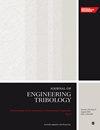增材制造生产的自润滑聚合物径向轴承摩擦系数和扭矩预测:一种机器学习方法
IF 1.8
3区 工程技术
Q3 ENGINEERING, MECHANICAL
Proceedings of the Institution of Mechanical Engineers, Part J: Journal of Engineering Tribology
Pub Date : 2023-08-25
DOI:10.1177/13506501231196355
引用次数: 0
摘要
增材制造是一项快速发展的技术,能够生产具有复杂几何形状的复杂零件。自润滑径向轴承是可以使用增材制造生产的机器元件之一。在这项研究中,我们提出了一种基于机器学习的方法来模拟由聚醚醚酮(PEEK)、聚乳酸(PLA)、丙烯腈丁二烯苯乙烯(ABS)和尼龙制造的自润滑径向轴承的摩擦系数和摩擦扭矩。提出的方法包括不同的机器学习模型(人工神经网络,支持向量机,回归树,线性回归模型),利用实验数据预测不同类型径向轴承的摩擦系数和摩擦扭矩。通过对自润滑径向轴承在不同工况下的摩擦学试验,获得了实验数据。结果表明,机器学习模型能够较好地预测自润滑径向轴承的摩擦系数和摩擦力矩。该方法可用于优化采用增材制造制造的自润滑径向轴承的设计和性能。本文章由计算机程序翻译,如有差异,请以英文原文为准。
Prediction of friction coefficient and torque in self-lubricating polymer radial bearings produced by additive manufacturing: A machine learning approach
Additive manufacturing is a rapidly developing technology that enables the production of complex parts with intricate geometries. Self-lubricating radial bearings are one of the machine elements that can be produced using additive manufacturing. In this research, we present a machine learning-based approach to model the friction coefficient and friction torque in self-lubricating radial bearings manufactured by additive manufacturing using polyether ether ketone (PEEK), polylactic acid (PLA), acrylonitrile butadiene styrene (ABS), and nylon. The proposed approach includes different machine learning models (artificial neural networks, support vector machines, regression trees, linear regression models) that utilize experimental data to predict the coefficient of friction and friction torque of different types of radial bearings. Experimental data were obtained by performing tribological tests on self-lubricating radial bearings under various operating conditions. The results reveal that the machine learning models are successful in predicting the friction coefficient and friction torque in self-lubricating radial bearings with high accuracy. The approach can be utilized to optimize the design and performance of self-lubricating radial bearings manufactured using additive manufacturing.
求助全文
通过发布文献求助,成功后即可免费获取论文全文。
去求助
来源期刊

CiteScore
4.20
自引率
5.00%
发文量
110
审稿时长
6.1 months
期刊介绍:
The Journal of Engineering Tribology publishes high-quality, peer-reviewed papers from academia and industry worldwide on the engineering science associated with tribology and its applications.
"I am proud to say that I have been part of the tribology research community for almost 20 years. That community has always seemed to me to be highly active, progressive, and closely knit. The conferences are well attended and are characterised by a warmth and friendliness that transcends national boundaries. I see Part J as being an important part of that community, giving us an outlet to publish and promote our scholarly activities. I very much look forward to my term of office as editor of your Journal. I hope you will continue to submit papers, help out with reviewing, and most importantly to read and talk about the work you will find there." Professor Rob Dwyer-Joyce, Sheffield University, UK
This journal is a member of the Committee on Publication Ethics (COPE).
 求助内容:
求助内容: 应助结果提醒方式:
应助结果提醒方式:


